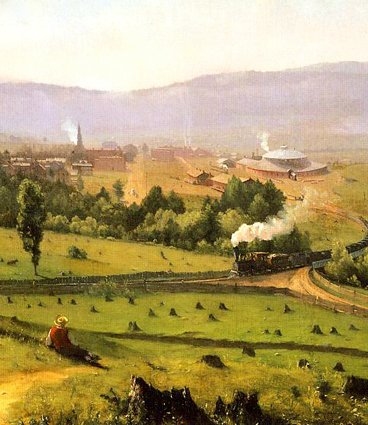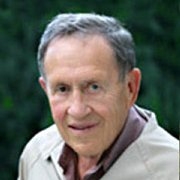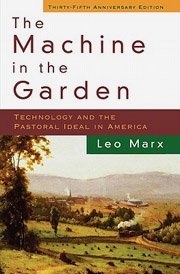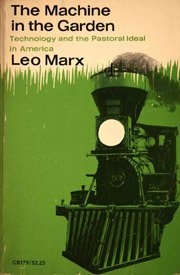MIT Professor Emeritus Leo Marx wrote “The Machine in the Garden: Technology and the Pastoral Ideal in America” in 1964, before cell phones, the Internet, and computers became omnipresent in American life. Yet today this work — centered on the tensions 19th-century authors saw as shaping American life — remains as relevant as ever.
On Nov. 8, Marx’s colleagues and former students gathered to celebrate the book’s 50th anniversary in an afternoon symposium at MIT. Speakers recounted the legacy of this seminal work in American studies and of the teacher and scholar who penned it.
Through it all, the guest of honor, Marx himself, now 94, sat quietly in the front row. Afterward, Marx called the event “most unusual and terribly moving.”
Two visions that shaped America
“The book is about cultural ambivalences towards the encroaching of science and technology in everyday life," said David Kaiser, Germeshausen Professor of the History of Science. "Marx was writing about railroads and telegraphy, and the larger notion is that technology allows great things — it knit the nation together — but it also seemed to tear down what had been safe spaces of the pastoral."
“The Machine in the Garden” examines the differences between the "pastoral" and "progressive" ideals that characterized early-19th-century American culture and that have evolved into the basis for current environmental debates.
“The power of Marx’s analysis and prose makes it still worth reading today,” added Kaiser, who is also head of MIT’s Program in Science, Technology, and Society (STS), which hosted the symposium jointly with the Marx family and Oxford University Press.
Coinciding with the 25th anniversary of MIT’s PhD program in History, Anthropology, and Science, Technology, and Society — which was marked on November 9 with a daylong symposium at MIT — the “Machine in the Garden” event drew more than 200 people to Wong Auditorium to reflect on Marx’s influence, both on his field and on the lives of his students and colleagues.
Daring, enduring, persuasive
After an introduction by Kaiser and a few words by Marx’s son Andrew, the event featured reflections by five key associates, beginning with a representative of the book’s publisher, Oxford University Press.
Emphasizing that it is “a remarkable accomplishment” for any book to remain in print continuously for 50 years, Niko Pfund, president and academic publisher of Oxford University Press USA, reminded everyone of what was happening the year “The Machine in the Garden” was first published: Barry Goldwater was running for president, Nelson Mandela was sentenced to life in prison, and Elizabeth Taylor had just married Richard Burton (for the first time).
“Through it all, ‘Machine in the Garden’ has consistently been a book people thought was important to read, one that makes sense of our relationship to history and technology,” Pfund said. “The book has gone through dozens of printings and sold hundreds of thousands of copies — an impressive figure by any measure.”
Alan Trachtenberg, a former graduate student of Marx’s who is now a professor emeritus of English and American studies at Yale University, stressed the book’s antecedents in the Cold War. He said “The Machine in the Garden” reveals rich crosscurrents among literary, economic, and political spheres, reflecting both Marx’s experience as a veteran of World War II and his socialist politics.
“What moved me most of all as an aspiring American studies scholar — and has remained a major bequest of the book — was and still is the book’s daring and movingly persuasive historicism,” Trachtenberg said. “Fifty years later, ‘The Machine in the Garden’ remains a work to live up to.”
A legendary teacher
David Nye, professor of American history at the University of Southern Denmark, emphasized that Marx was not only a great writer but a wonderful teacher. Nye studied with Marx as an undergraduate at Amherst College, where Marx taught before coming to MIT in the 1970s to help launch STS.
“One reason the book was so accessible is that it had been taught before it was written; it had been honed over time,” Nye said. “There’s an unfortunate pressure now to rush things into print. The link between teaching and research was clear here.”
Rebecca Herzig PhD ’98 also lauded Marx’s teaching. A former advisee of Marx’s, Herzig is now a professor of women and gender studies at Bates College. “I am and always will be Leo’s devoted student, striving to be half the teacher and half the mensch he is,” she said.
Rosalind Williams, Bern Dibner Professor of the History of Science and Technology, offered her recollections of teaching classes at MIT with Marx. What impressed her the most, she said, was his relentless dedication to the task. No syllabus was ever complete; Marx was always honing his approach to teaching great literature. And, Williams noted, “He is never teaching his book. He’s teaching the books in his book, classics like ‘Walden’ and ‘Moby Dick.’”
The afternoon’s formal remarks were followed by a lively comments period, which enabled Marx’s many admirers to offer their own recollections of the man and his work.
Story prepared by MIT SHASS Communications
Editorial and Design Director: Emily Hiestand
Senior Writer: Kathryn O'Neill
Communications Assistant: Kierstin Wesolowski









